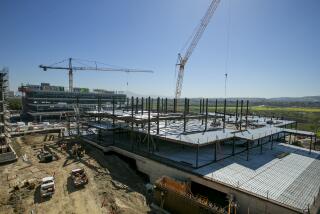Artificial Heart Makers Pumped Up
- Share via
TUCSON — Researchers who plan to apply this year for federal approval of an artificial heart are so optimistic that they are moving the manufacturing plant that makes the devices from Canada to Arizona.
The heart is used only as a temporary device until patients are well enough to undergo a heart transplant.
Results of the CardioWest artificial heart study have been encouraging so far, said Richard Smith, a biomedical engineer at the University of Arizona Medical Center who heads the project underway at five U.S. heart transplant centers.
Smith and others believe that the study will persuade the U.S. Food and Drug Administration that the device should be marketed to the busiest heart transplant centers. It’s the only one available that completely replaces a patient’s own heart.
“We have the numbers today to go forward with the premarket approval application,” Smith said.
CardioWest plans to submit an application to the FDA this year for approval. But the application also must show that the system--including the heart and equipment to run and monitor it--can be manufactured.
Moving the manufacturing plant from Vancouver to Tucson is aimed at making it easier to go commercial.
A 6,500-square-foot, state-of-the-art production facility is being built in a warehouse about two miles from the university’s medical complex.
“The goal is to bring all of this together to meet all the stringent regulatory requirements for commercialization,” Smith said.
The air-powered, two-chambered plastic pump would be used only in situations where no other artificial heart pump now available will suffice. That could include patients who already have an artificial valve, or where both left and right ventricles are in failure.
Preliminary figures show survival rates above 90%, which pleases Smith.
“It works. It’s technology that should be made available,” said Dr. Jack Copeland, chief heart surgeon at the Arizona center.
CardioWest is a nonprofit partnership of University Medical Center and the University of Utah’s Medforte Research Foundation. It brought in consultants to determine whether to keep the business once government approval is obtained, then to develop a business model and five-year plan, and finally to design an efficient plant, Smith said.
The new plant will be able to produce at least 10 to 15 hearts per month, Smith said. The devices now cost American centers in the study $32,500 apiece.
A key goal of the new operation will be to develop a portable driver that can be worn on a patient’s back at home. The consoles now used weigh several hundred pounds and are the size of a washing machine.
It’s difficult to pinpoint how many artificial hearts would be needed in a given year, Smith said. “It’s a very limited market.”
The likeliest customers are about 50 centers in the United States that perform at least 25 heart transplants annually and have waiting lists of 50 or more patients.
In all, about 125 American medical centers perform about 2,000 heart transplants annually. Worldwide, only about 3,000 are done each year.
Not all patients to receive an artificial heart implant in the continuing study have met all criteria, which range from age limits of 18 to 60 to proven right-sided heart failure.
Of 24 patients who have met all criteria, 23 of them, or nearly 96%, went on to receive human transplants. And 22 of the 24, or 91.6%, are alive today, Smith said.
The study, which began four years ago, officially includes only the FDA-authorized U.S. centers in Tucson, Chicago, Pittsburgh, Milwaukee and Salt Lake City.
In all, there have been 37 implants of the device in the United States and six in Canada, as well as 44 in Europe--87 total worldwide--since the study began.






